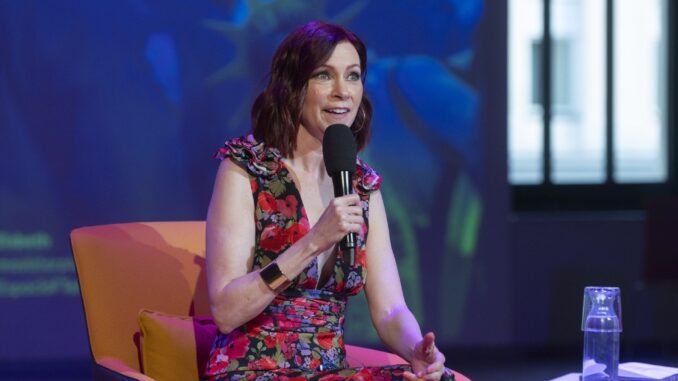
The Quantum Logic of Unforgettable: Carrie Preston's Career, Characters, and the Elsbeth Enigma
In the constellation of television talent, some stars burn with a sudden, brilliant flash, while others, like Carrie Preston, emit a steady, enduring light, illuminating every corner of the narrative landscape they inhabit. Her career is not merely a trajectory but a masterclass in versatility, a testament to the power of a performer who understands that the most profound impact often lies in the most exquisitely observed detail. And if there is one character that crystallizes Preston's singular genius, one that has etched itself into the annals of TV history as truly "unforgettable," it is the inimitable, the bafflingly brilliant, Elsbeth Tascioni.
Preston’s journey through the performing arts is marked by an unwavering commitment to the craft, rather than a chase for conventional stardom. From her foundations in the rigorous world of theater, she brought a disciplined gravitas and a playful fearlessness to every screen role. Her filmography reads like a character actor’s dream, bouncing effortlessly from the gothic sensuality of True Blood’s Arlene Fowler to the sharp-witted intellectualism of Person of Interest’s Amanda Warren, and the morally ambiguous comedic edge of Polly in Claws. Each role, no matter its size, is imbued with a distinct psychological landscape, a testament to Preston's belief that every person, fictional or real, possesses layers waiting to be uncovered. She doesn't just play roles; she inhabits them, breathing life into characters that, in lesser hands, might simply be plot devices. Her career is a conversation with the spectrum of human experience, articulated through a constantly evolving parade of distinct voices, postures, and internal worlds.
What truly makes Preston's characters unforgettable, beyond the writing itself, is her rare ability to embrace and amplify their inherent quirks. She finds the humanity in the eccentric, the vulnerability in the strong, and the unexpected wisdom in the seemingly naive. This approach is perhaps best exemplified, and certainly most celebrated, in her portrayal of Elsbeth Tascioni. When Carrie Preston talks about her career and characters, one imagines her speaking of Elsbeth with a particular blend of reverence and glee, for this lawyer is more than a role; she is a phenomenon.
Elsbeth Tascioni, first gracing the screens in The Good Wife and now headlining her own eponymous series, is not just TV’s most unforgettable lawyer; she is a beautifully tailored human non-sequitur, a walking, talking enigma wrapped in a pastel cardigan. On the surface, Elsbeth is a whirlwind of charming distraction. Her mind, it seems, operates on a quantum level, constantly flitting between obscure observations about everything from the color of a juror’s tie to the intricacies of taxidermy, often mid-sentence during a high-stakes cross-examination. Her questions can seem tangential, her expressions innocently bewildered, and her grasp of the immediate conversation often appears tenuous. She is a masterclass in weaponized fluster.
Yet, this perceived disorganization is her greatest superpower. Preston's genius lies in meticulously crafting Elsbeth's dual nature: the seemingly ditzy exterior that masks a mind of unparalleled, almost surgical, strategic brilliance. The "wait, what?" moments from other characters are not just comedic beats; they are crucial markers in the audience’s journey from underestimation to awe. Preston ensures that every wide-eyed blink, every hesitant pause, every seemingly irrelevant observation is precisely placed, building towards the inevitable, exhilarating reveal when Elsbeth, with quiet confidence, connects the seemingly disparate dots, dismantling her opponents with an elegant, almost accidental, precision. She doesn't argue facts; she sees the deeper patterns, the hidden motivations, the illogical gaps that everyone else misses. She weaponizes her own perceived strangeness.
In discussing her process, Preston has often spoken of the joy of "getting to play" in the space of such rich characters. For Elsbeth, this means delving into a character who defies conventional legal drama tropes. There's no bombastic courtroom rhetoric, no power suits, no icy glares. Instead, Elsbeth wins with a gentle, disarming intelligence that sneaks up on you, a disarming earnestness that makes her both relatable and profoundly unique. Preston ensures that Elsbeth is never a caricature; her quirks are organic, her empathy genuine, and her moral compass, though unconventional, is deeply rooted in a desire for justice.
Carrie Preston's career is a vibrant tapestry woven with distinct characters, each brought to life with meticulous care and profound understanding. But it is in Elsbeth Tascioni that her illustrative power truly shines, embodying the very essence of what it means to be unforgettable. She has not just played a character; she has created an archetype, a testament to the idea that true brilliance can come in the most unexpected, and delightfully quirky, packages. Preston's work reminds us that the greatest lawyers, like the greatest actors, are often those who see the world, and its inhabitants, with an entirely unique, and utterly unforgettable, perspective.
